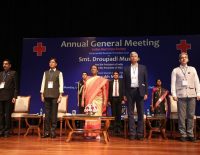CNS Tuberculosis: Experts prioritize early diagnosis, surgery technique and Brain Shunt Management

Tuberculosis remains a major health problem in India, causing approximately 220,000 deaths each year. In a bid to combat this issue, the Indian government launched the National TB Elimination Program with a target to eliminate tuberculosis from the country by 2025. Central nervous system (CNS) involvement is observed in 5 to 10% of extrapulmonary TB cases and accounts for around 1% of all TB cases. The management of CNS TB is particularly challenging as it differs significantly from TB in other parts of the body, resulting in higher mortality and morbidity rates. Late diagnosis due to atypical signs and symptoms, and the lack of typical radiological features further compound the problem.
Health experts have unveiled a clinical scoring system designed to facilitate early diagnosis of CNS TB. The user-friendly system enables doctors to quickly identify patients likely to have TB through a predictive value assessment, allowing for appropriate investigation and treatment. Additionally, experts discussed a new indigenous surgery technique developed in India, which has demonstrated promising results in improving patient outcomes.
A significant announcement made during the event was the setting up Grant for Brain Shunt Management. The Grant was awarded to the team of Sir Ganga Ram Hospital which presented an innovative method of measuring brain oxygenation, which helps predict the outcome of brain shunt management.
Dr. Samir Kalra, Senior Consultant and professor of Neurosurgery at Sir Ganga Ram Hospital, shared insights into Brain Shunt Management, highlighting the prevalence of hydrocephalus and its treatment through shunt tubes. Dr. Kalra emphasized the success of their technique, which utilizes laparoscopic aid and significantly reduces complication rates.







